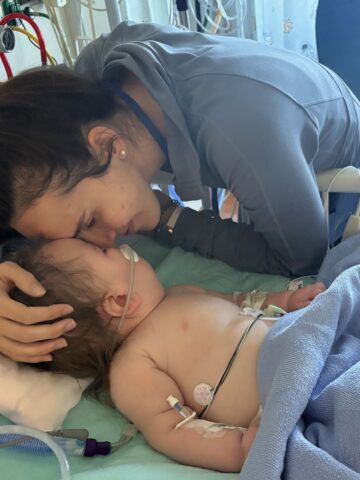Parents, researchers and physicians will share the latest developments from the lab and clinic in the battle against the diverse and rare family of mtARS mitochondrial diseases at an all-day virtual event Feb. 10, 2023.
CHOC’s Dr. Jose Abdenur, chief of the division of metabolic disorders and director of the metabolic laboratory, will be among the presenters at the symposium, 10 a.m. to 3 p.m.
Other CHOC presenters include pediatric geneticist Dr. Neda Zadeh and Brent Dethlefs, executive director of the CHOC Research Institute.
Desiree Magee, parents of Daphne, 7, helped co-produce this year’s online seminar, which will feature more than 100 participants. Desiree is co-founder, with Ashley Rowland, of the non-profit CureARS, which aims to fund research that could lead to potential treatment options.
Daphne, diagnosed with the potentially fatal brain disease leukoencephalopathy with thalamus and brainstem involvement with high lactate (LTBL), is a patient of Dr. Abdenur, whose diverse team of geneticists, neurologists, researchers and physicians were able to get Daphne on the right treatment plan by her first birthday.

“A big thing about mitochondrial disease there’s a huge spectrum in how the disorder presents in children,” says Richard Magee, Daphne’s father. “Really, the name of the game is to prevent other stresses on the child, whether it be infection, dehydration, or fatigue – stressors that can exacerbate the condition. Dr. Abdenur understands this well and keeps it at the forefront of his mind and collaborates with parents in response to their feedback.”
Desiree started a non-profit, Daphne’s Lamp, for families of loved ones with mitochondrial disease who typically find themselves in David-vs.-Goliath scale battles against drug companies, against insurance companies, against the medical establishment.
Through financial aid and advocacy, the organization seeks to improve the quality of life of those affected by these diseases by improving their access to prescription drugs, vitamins, supplements, orthotics and mobility devices.
Daphne takes a daily cocktail of prescription medications and supplements. The first-grader is very independent and lives life to the fullest, her parents say. The Magees have another daughter, Adelaide, 15, who is healthy.
The Magees credit Dr. Abdenur and his staff for helping Daphne avoid hospitalizations by seeing her in his clinic or providing over-the-phone consultations when she has gotten ill.
Dr. Abdenur has been willing to continue to fine tune Daphne’s cocktail of supplements based not only on the panel of biomarkers his team monitors and the latest research from both his own lab and around the world, but also from the Magees input as parents, they say.
The best way to help mitochondrial patients is to empower their parents, Desiree says. Conferences like this week’s CureARS event are critical to that mission as well as to raising awareness and generating more research into these rare diseases, she adds.
This year marks the second year Desiree and Ashley helped organize the event, which now is a NORD-approved event.
In November 2021, CHOC, in partnership with UCI Health, was designated a Rare Disease Center of Excellence by the National Organization for Rare Disorders (NORD), joining a new and highly select group of 31 medical centers seeking to expand access and advance care and research for rare disease patients in the United States.
To register for the CureARS event, which is open to the public, click here.
Learn more about metabolic rare disease research




